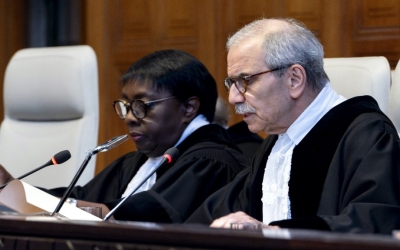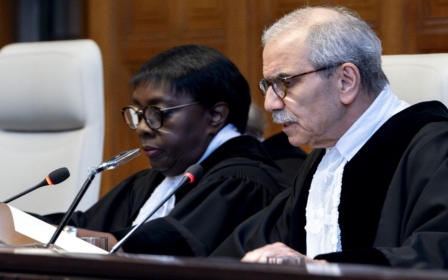ICJ opinion necessitates arranging Palestinian right to return to 1967 lands, legal experts say

Legal experts are describing the opinion by the International Court of Justice (ICJ) issued on Friday as a striking and historic initiative that requires taking several legal steps, including allowing for the return of Palestinians who were displaced by Israel when it began its occupation of the Palestinian territories in 1967.
The advisory opinion delivered by the World Court said that Israel must make reparations to Palestinians for damages caused by its occupation, and that the UN Security Council, the General Assembly and all countries have an obligation to not recognise Israel's occupation as legal.
It also said that Israel is systematically discriminating against Palestinians in the occupied territory, and Israel has effectively annexed large portions of that territory through its occupation.
Experts in international law who spoke to Middle East Eye noted that this is only an advisory opinion and is not legally binding. However, the significance of the court's conclusion on the matter could have a significant impact on Israel's reputation, which has already been affected by its war on Gaza which has killed tens of thousands of Palestinians so far.
It could also have a significant impact on the larger legal discourse surrounding Israel's treatment of Palestinians.
New MEE newsletter: Jerusalem Dispatch
Sign up to get the latest insights and analysis on Israel-Palestine, alongside Turkey Unpacked and other MEE newsletters
"In my opinion, this is very close to a legal conclusion that Israel engages in apartheid," George Bisharat, a professor at the University of California College of the Law, San Francisco, told MEE.
"This is another, I would say, hammer blow to Israel and its interests."
One of the main points of emphasis in the opinion's section on "Consequences for Israel" discussed the need for restitution for Palestinians who were forced from their lands when Israel began its occupation of the West Bank, East Jerusalem and Gaza in 1967.
That restitution, as noted by the court, includes "Israel’s obligation to return the land … seized from any natural or legal person since its occupation started in 1967".
"In my opinion, this indicates the need for taking necessary steps to arrange the return of displaced Palestinians and those who have fled," Saeed Bagheri, a professor of international law at Reading School of Law in the UK, told MEE.
While the opinion does not discuss the broader Palestinian right to return that has been outlined by United Nations resolutions, the opinion's discussion of return and restitution could hold a bearing on the lives of hundreds of thousands of Palestinians.
"It's still quite striking. There was a massive displacement of Palestinians in 1967 of somewhere between 200,000 and 350,000 who were expelled outside of the West Bank into Jordan," Bisharat said.
"This aspect of the legal judgement is very significant."
'A historic initiative'
The release of the opinion comes more than a year and a half after the United Nations passed a resolution calling on the ICJ to weigh in on Israel's occupation.
That request came after Human Rights Watch released a landmark report saying that Israel is guilty of the "crimes of apartheid" in the occupied Palestinian territories. Amnesty International came to a similar conclusion in February 2022.
The opinion also comes after 10 months of Israel's war on Gaza, which started in October after Hamas launched an attack on southern Israel that killed around 1,200 people and took around 240 others captive.
Israel responded with a full-fledged war and indiscriminate bombing campaign that has killed nearly 40,000 Palestinians, according to the Palestinian health ministry in Gaza.
During the span of this war, the ICJ was also forced to respond to a complaint filed by South Africa, where the country accused Israel of committing genocide in Gaza.
In January, the court issued an interim ruling saying that it was plausible Israel was committing genocide, and since then several countries have joined South Africa by filing submissions in support of the complaint.
For the legal specialists, Friday's advisory opinion and its place in the current conversation around Israel's occupation will have a major influence on the global community. While any resolution at the UN Security Council can be vetoed by Israel's ally, the United States, this opinion will continue to bring more attention to Israel's treatment of the Palestinian land it occupies.
"This is a very historic initiative that has significant implications as the Court required both the UN General Assembly and the UN Security Council to take further actions to ensure peace in the occupied territories," Bagheri said.
Middle East Eye delivers independent and unrivalled coverage and analysis of the Middle East, North Africa and beyond. To learn more about republishing this content and the associated fees, please fill out this form. More about MEE can be found here.






